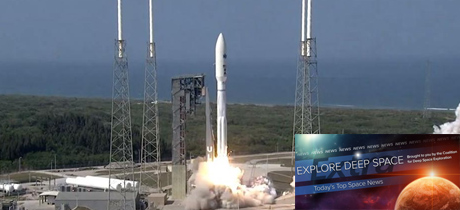In Today’s Deep Space Extra… Though Kazakhstan is in the midst of a coronavirus quarantine, Russia is “go” for the return of two NASA astronauts and a cosmonaut from the International Space Station (ISS) in a remote region next month. Veteran astronauts offer advice for dealing with the effects of social isolation due to the pandemic. The U.S. Space Force launches its first mission.
Human Space Exploration
Russia’s Roscosmos sees no need to postpone ISS crew’s return to Earth over coronavirus
TASS of Russia (3/26): Though Kazakhstan is under a coronavirus quarantine, the Russian Space Agency has no plans to delay the planned April 17 return to Earth of NASA astronauts Drew Morgan and Jessica Meir and cosmonaut Oleg Skripochka aboard their Soyuz capsule. Their descent into remote Kazakhstan will end missions to the International Space Station (ISS) that began in July and September.
‘Become experts on the thing that is threatening you’: Advice from astronauts on isolation on Earth
Washington Post (3/25): NASA’s Christina Koch, veteran of a 328 day mission to the International Space Station (ISS) that ended earlier this year, and Canadian astronaut Chris Hadfield, who spent five months aboard the Station in 2012-13, found that playing live music helped to overcome some of the isolation that a global response to the coronavirus pandemic is introducing to everyday life on Earth.
Space Science
How coronavirus is putting NASA’s space race in jeopardy
Coalition Member in the News – Lockheed Martin
Houston Chronicle (3/26): Lucy, a NASA mission to Jupiter to study Trojan asteroids, must come together by October 21, the opening of a 21-day launch window. But critical elements of the spacecraft are distributed across the U.S., which is in the midst of a self-isolation and telework environment to counter the coronavirus pandemic. Lucy is just one example of many missions on NASA’s space agenda vulnerable to deadlines and dealing with the disruption.
ESA puts four science missions on hold during pandemic
SpaceNews.com (3/25): The European Space Agency (ESA) has placed the Mars Express and ExoMars Trace Gas orbiters; Solar Orbiter; and Cluster science mission in Earth orbit in safe mode, so ground control personnel can stand down during the coronavirus pandemic.
10.9 million names now aboard NASA’s Perseverance Mars rover
NASA/Jet Propulsion Laboratory (3/26): More than 10.9 million people from around the world submitted their names to travel with NASA’s Mars 2020 rover, which is to launch during a July/August window. Student essays proposing names for the rover have also been stenciled on microchips and placed aboard along with the names. Perseverance was the winning entry in the Name the Rover contest open to U.S. K-12 students.
Highest resolution mosaic image of the surface of Bennu
Universetoday.com (3/26): Asteroid Bennu’s boulder strewn surface is under close-up surveillance by NASA’s Osrisis-Rex spacecraft. The probe’s mission scientists intend to descend briefly in late August to gather a sample of surface material for return to Earth. They hope to learn more about the role carbon rich asteroids played in planet formation, the distribution of water and the organics that provide the building blocks for life.
Scientists use the Milky Way to hunt for dark matter
Space.com (3/26): Mysterious dark matter, though invisible is believed to permeate the universe, decaying over time into ordinary matter. A long running study of the Milky Way using the XMM-Newton Space X-ray telescope has helped to advance the search and deepen the mystery.
Other News
Trump’s Space Force just launched its first-ever satellite into orbit
Coalition Members in the News – Lockheed Martin, United Launch Alliance
Forbes (3/26): The U.S. Space Force marked its first official launch on Thursday, the launch of an Atlas 5 from Cape Canaveral Air Force Station, Florida, with a military communications satellite at 4:18 p.m., EDT.

